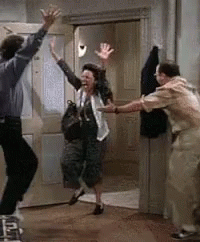

Index
click on the desired section to move there directly

Introduction
I have to thank @lezra for talking to me about this movie. I am an Aerospace Engineer and I work as a researcher at the University of Bologna, working on space exploration missions, collaborating with space agencies such as ESA and NASA itself, so it is a very close environment for me.
For those who don't know, Hidden Figures is a film about 3 brilliant African-American women from NASA - Katherine Johnson, Dorothy Vaughan, and Mary Jackson, who were the masterminds behind one of the greatest operations in history: the launch of astronaut John Glenn into orbit, an extraordinary feat that restored the nation's confidence, turned the space race around and galvanized the world.
I start from the premise that regardless of my proximity to this environment, I enjoyed the film and found it very interesting. I have no idea if the movie is accurate, historically, or if it has been crafted ad hoc to make it inspirational. What I think is essential in this case it is that it gives these 3 women the right exposure and the credit they deserve.
press here to scroll back to the index

Sexism
This film focuses on two topics in particular: sexism and racism. Not only do the protagonists have to fight against discrimination due to the color of their skin, they also have to deal with a purely macho environment as NASA (Aerospace Engineering more generally) was at the time. In one of the scenes of the film, Dorothy asks to be allowed access to the mission debriefing in order to get all the information live and to be able to update her calculations, but it is explained to her that women are not usually admitted to certain types of activities (it will only be the intervention of Al Harrison, head of the space task, that will allow her to enter).
I remember that when I started my studies in the Faculty of Aerospace Engineering, the number of male students compared to women was definitely higher (I would say 1 in 8 more or less). Lately, I see things changing, in the sense that many more women are approaching this world, but I feel that there is still a lot of progress that can be made because I believe that still, the Engineering way has remained a still slightly masculine environment.
Watching these films, I always think about how many women throughout history could have contributed to the technological progress of mankind if only they had been given the same means and resources as men. The other thought that comes to mind is also how many women's contributions to science over the years were not taken into account enough or even 'stolen' because the society of the time allowed it.
press here to scroll back to the index

Racism
The other hot topic in the film is of course racism. In the film, we see very well how society in the 1960s, where there were separate bathrooms for whites and 'colored' people, where black people had to sit in the last seats, and where their credibility in certain areas was quite discredited because they were considered less intelligent. This story shows us how in reality skin color does not make one person dumber than another, but geniuses, the real ones, knows no race or color.
Unfortunately, the sad thing is that there are still racist people today, and frankly I find this quite ridiculous in itself, as I find that those who consider themselves superior to someone else simply because of the color of their skin, merely prove by this reasoning, that they have nothing superior at all.
The thing that heartens me by seeing a film like this is that even in a profoundly racist environment, as America was in those years, there are people who do not look at the color of their skin, but in the name of teleological progress, judge people by their abilities and skills. Kevin Kostner's character, i.e. Al Harrison, in this sense is very powerful, it shows that even when everything and everyone seems to say that a certain belief is correct, we still have a choice and can still make a difference in our own small way. I am convinced that 100 years from now, new societies will look at ours the same way we look at the racist and sexist society of 100 years ago now... Everything that is deemed to be right or socially acceptable now, will not necessarily be right in the future, and maybe in our own small way, we can be the ones to make a difference and bring progress forward.
press here to scroll back to the index

Memorable moment
The scene that I found most powerful in the film, even if it is a bit obvious since it is also in the film's trailer, is the bathroom scene... Dorothy comes back to the office all wet with her paperwork in hand, while her boss, Al Harrison, was looking for her. The latter confronts her, asking her why she disappears every day for more than 40 min without saying anything, and the young woman, exasperated, bursts out, and almost screaming tells him that for her there are no toilets there, the only toilets available to black people, are in another building, which is about 30 min walk away, and that she has to walk that distance every day every time she wants to go to the toilet. In the next scene, Al, destroys the sign for toilets for colored people, saying that no such distinctions are admitted anymore and that everyone pees the same color at NASA.

Plot
The movie tells the true story of African-American mathematician Katherine Johnson (Taraji P. Henson), who worked on NASA's space program during the space race alongside Mary Jackson (Janelle Monáe) and Dorothy Vaughan (Octavia Spencer). They were able to help John Glenn complete the first full orbit of the Earth by planning the paths for the Apollo 11 mission and the Mercury Program.
press here to scroll back to the index

Conclusion
The story of these three women is an incredible source of inspiration for all those who want to pursue their dreams, regardless of race or gender.
The cast does a fantastic job acting out the plot, which develops between the characters' personal and professional life. It is a tale of genius that is never self-serving or greedy, and it is made stronger by the cooperation of three powerful women who, at a time when it was virtually the norm, fought against discrimination based on gender and race.
Not everything is flawless, though: the lack of creativity in the narration, the overly casual treatment of some subjects, and the overly predictable nature of the events may irritate more attentive viewers. But I still would like to strongly recommend you the movie, cause these three ladies deserve much more knowledge and credit than history has given them!!!
press here to scroll back to the index

Rating
My personal vote is:
7.5/10
press here to scroll back to the index

Farewell image and text separators, created by me with Canva

